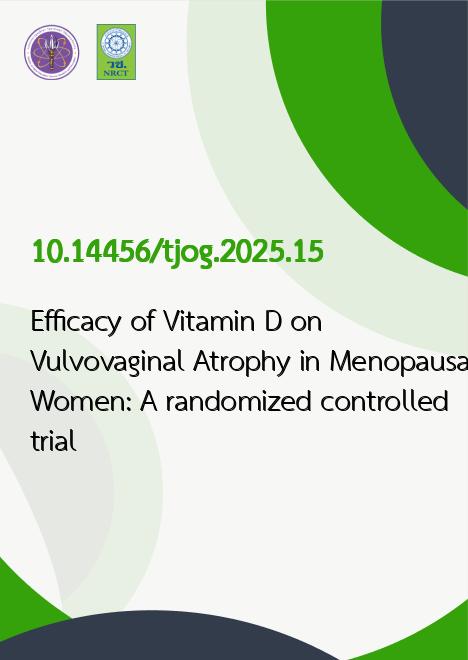
|
Efficacy of Vitamin D on Vulvovaginal Atrophy in Menopausal Women: A randomized controlled trial |
|---|---|
| รหัสดีโอไอ | |
| Creator | Chirocha Hengphrathani |
| Title | Efficacy of Vitamin D on Vulvovaginal Atrophy in Menopausal Women: A randomized controlled trial |
| Contributor | Siraya Kitiyodom |
| Publisher | PIMDEE Co., Ltd. |
| Publication Year | 2568 |
| Journal Title | Thai Journal of Obstetrics and Gynaecology |
| Journal Vol. | 33 |
| Journal No. | 2 |
| Page no. | 136-147 |
| Keyword | postmenopausal women, vulvovaginal atrophy, vitamin D |
| URL Website | https://tci-thaijo.org/index.php/tjog/index |
| Website title | www.tci-thaijo.org |
| ISSN | 2673-0871 |
| Abstract | Objectives: To evaluate the efficacy of oral vitamin D supplementation in improving vulvovaginal atrophy in postmenopausal women over a 12-week period.Materials and Methods: A double-blind randomized controlled trial involved 48 postmenopausal women with vulvovaginal atrophy. Participants were assigned to receive either 60,000 IU ergocalciferol weekly or placebo. Blinding was applied to both participants and healthcare providers. The primary outcome was vaginal maturation value (VMV) at 12 weeks. Secondary outcomes included VMV at 6 weeks, vaginal atrophy symptoms (VAS), modified vaginal health index (mVHI), vaginal atrophy score (VVA), vitamin D levels, and vaginal pH at 6 and 12 weeks. Results: Baseline characteristics were not statistically significant between the two groups. In the intention-to-treat analysis, at 12 weeks after treatment, the vitamin D group exhibited significantly higher VMV compared with placebo (47.8 ? 25.24 and 27.4 ? 29.31, p = 0.027) and increased superficial cell count (p = 0.036). Furthermore, significant improvements in vaginal health index were observed in the vitamin D group at 6 and 12 weeks after treatment (VAS: p = 0.030 and p < 0.001, mVHI: p < 0.001 and p < 0.001, VVA: p < 0.001 and p < 0.001, vaginal pH: p = 0.001 and p < 0.001, vitamin D level: p < 0.001 and p < 0.001). Conclusion: Vitamin D demonstrated superior efficacy over placebo in treating vulvovaginal atrophy in postmenopausal women. Those administered with vitamin D exhibited statistically significant enhancements in vaginal health index, including increased VMV, mVHI, and vitamin D levels, alongside decreased VAS, VVA, and vaginal pH. Therefore, vitamin D may be considered as an alternative treatment option for menopausal women with vulvovaginal atrophy, particularly in those with contraindications to hormone replacement therapy, vitamin D insufficiency, and vitamin D deficiency. |
